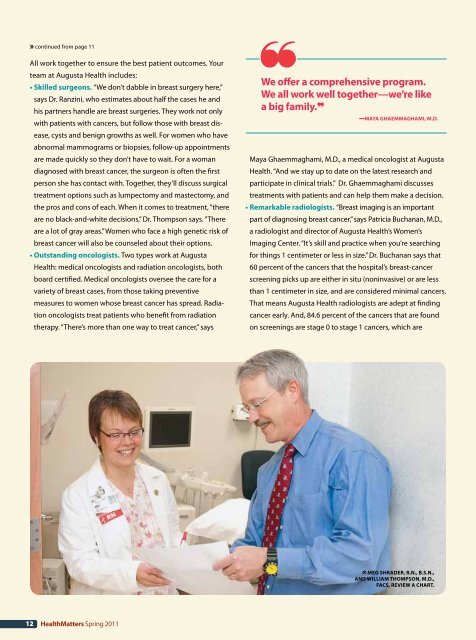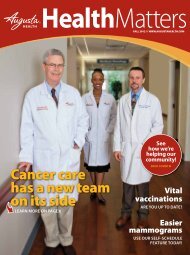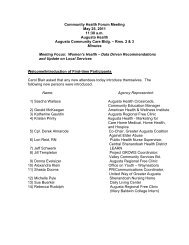You also want an ePaper? Increase the reach of your titles
YUMPU automatically turns print PDFs into web optimized ePapers that Google loves.
continued from page 11<br />
All work together to ensure the best patient outcomes. Your<br />
team at <strong>Augusta</strong> <strong>Health</strong> includes:<br />
• skilled surgeons. “We don’t dabble in breast surgery here,”<br />
says Dr. ranzini, who estimates about half the cases he and<br />
his partners handle are breast surgeries. They work not only<br />
with patients with cancers, but follow those with breast disease,<br />
cysts and benign growths as well. For women who have<br />
abnormal mammograms or biopsies, follow-up appointments<br />
are made quickly so they don’t have to wait. For a woman<br />
diagnosed with breast cancer, the surgeon is often the first<br />
person she has contact with. Together, they’ll discuss surgical<br />
treatment options such as lumpectomy and mastectomy, and<br />
the pros and cons of each. When it comes to treatment, “there<br />
are no black-and-white decisions,” Dr. Thompson says. “There<br />
are a lot of gray areas.” Women who face a high genetic risk of<br />
breast cancer will also be counseled about their options.<br />
• Outstanding oncologists. Two types work at <strong>Augusta</strong><br />
<strong>Health</strong>: medical oncologists and radiation oncologists, both<br />
board certified. Medical oncologists oversee the care for a<br />
variety of breast cases, from those taking preventive<br />
measures to women whose breast cancer has spread. radiation<br />
oncologists treat patients who benefit from radiation<br />
therapy. “There’s more than one way to treat cancer,” says<br />
12 <strong>Health</strong>Matters Spring 2011<br />
❝<br />
we offer a comprehensive program.<br />
we all work well together—we’re like<br />
a big family.❞<br />
—MaYa gHaeMMagHaMi, M.D.<br />
Maya ghaemmaghami, M.D., a medical oncologist at <strong>Augusta</strong><br />
<strong>Health</strong>. “And we stay up to date on the latest research and<br />
participate in clinical trials.” Dr. ghaemmaghami discusses<br />
treatments with patients and can help them make a decision.<br />
• Remarkable radiologists. “Breast imaging is an important<br />
part of diagnosing breast cancer,” says Patricia Buchanan, M.D.,<br />
a radiologist and director of <strong>Augusta</strong> <strong>Health</strong>’s Women’s<br />
Imaging Center. “It’s skill and practice when you’re searching<br />
for things 1 centimeter or less in size.” Dr. Buchanan says that<br />
60 percent of the cancers that the hospital’s breast-cancer<br />
screening picks up are either in situ (noninvasive) or are less<br />
than 1 centimeter in size, and are considered minimal cancers.<br />
That means <strong>Augusta</strong> <strong>Health</strong> radiologists are adept at finding<br />
cancer early. And, 84.6 percent of the cancers that are found<br />
on screenings are stage 0 to stage 1 cancers, which are<br />
Meg sHRaDeR, R.n., b.s.n.,<br />
anD williaM tHOMPsOn, M.D.,<br />
Facs, Review a cHaRt.





